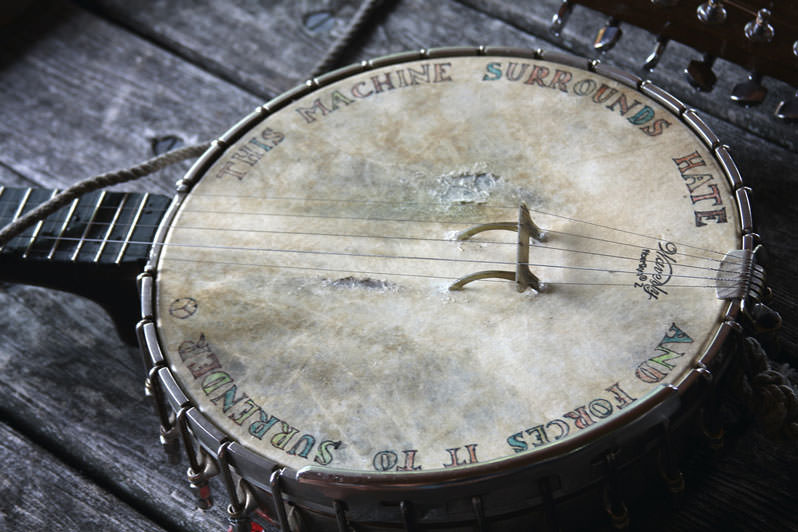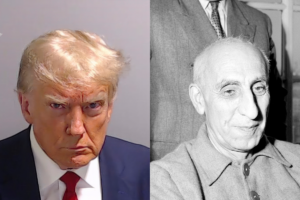Pete Seeger Outlasted the Bastards
Pete Seeger wasn't one of those legendary performers who made the world a better place with music. He was the original. He was inimitable and unique and indomitable in his mission to bring light to the dark places. Pete Seeger's banjo, inscribed with the words "this machine surrounds hate and forces it to surrender." Photo: Jim, the Photographer (CC-BY)
Pete Seeger's banjo, inscribed with the words "this machine surrounds hate and forces it to surrender." Photo: Jim, the Photographer (CC-BY)
Pete Seeger wasn’t one of those legendary performers who made the world a better place with music. He was the original. He was inimitable and unique and indomitable in his mission to bring light to the dark places.
The voice that made “We Shall Overcome” the anthem of the civil rights movement, that would not stop singing to appease the House Unamerican Activities Committee, that voice is gone, but its legend, and its good works endure.
Quoting from John Nichol’s excellent obituary on Seeger in The Nation, “Bruce Springsteen told Pete Seeger: ‘You outlasted the bastards, man.’ And so he did.”
We’ll post more from Nichol’s piece below, after a recent interview with Amy Goodman on “Democracy Now.”
Let us first take a moment to remember the loss of an original, irreplaceable American whose life, though ended, will continue to guide everything we at this publication endeavor to achieve.
— Posted by Peter Z. Scheer
From John Nichol’s obituary in The Nation, titled “Pete Seeger: This Man Surrounded Hate and Forced it to Surrender”:
Your support matters…Seeger, who died Monday night at age 94, was singing with Woody Guthrie when “This Land Is Your Land” was a new song. And because he meant and lived every word of the oft-neglected final verse – “Nobody living can ever stop me, As I go walking that freedom highway; Nobody living can ever make me turn back, This land was made for you and me” – Seeger was hauled before the House Un-American Activities Committee, blacklisted and sent for a time in the late 1950s and early 1960s to the sidelines of what was becoming an entertainment industry.
But Seeger kept singing Guthrie’s “This Land…,” kept writing songs of his own like “Where Have All the Flowers Gone,” kept playing a banjo inscribed with the message “This machine surrounds hate and forces it to surrender,” and kept traveling across the country and around the world – for every cause from labor rights to civil rights to environmentalism to peace.
Before he was convicted in 1961 on contempt of Congress charges – for refusing to name the names of the Young Communists and Young Socialists he had organized with and sung for in those heady 1930s and 1940s days of anti-fascist organizing — Seeger acknowledged that “The House committee wished to pillory me because it didn’t like some few of the many thousands of places I have sung for.” But he explained, “I have been singing folksongs of America and other lands to people everywhere. I am proud that I never refused to sing to any group of people because I might disagree with some of the ideas of some of the people listening to me. I have sung for rich and poor, for Americans of every possible political and religious opinion and persuasion, of every race, color, and creed.”
That sense and sensibility was stronger than the forces that sought to silence him. The son of privilege who lived for a good bit of time with his dear wife Toshi in a cabin that had no running water or electricity but offered an exceptional view of the Hudson River he loved, never lost what Springsteen hailed as a “stubborn, nasty, defiant optimism.” And the radical singer of radical songs about radical notions like loving one another, and talking rather than shooting, and singing rather than surrendering, lived long enough to have been a best-selling artist in 1950 – crooning “Goodnight Irene” with the Weavers – and a Grammy nominee in 2014.
Pete could have been excused for resting on his laurels after his contempt conviction was overturned by a federal appeals court in 1962 and the folk music boom of the 1960s restored his celebrity. But he had already thrown himself into the thick of the civil rights movement, helping young Guy Carawan to introduce a variation on an old spiritual to a new movement as “We Shall Overcome.” By 1967, he was upsetting the CBS censors by proposing to perform on “The Smothers Brothers Comedy Hour” his song “Waist Deep in the Big Muddy,” with its closing lines: “Every time I read the paper/those old feelings come on/We are waist deep in the Big Muddy and the big fool says to push on.” It was assumed that Pete was taking a poke at Lyndon Johnson’s march into the quagmire of Vietnam. And, of course, he was doing just that.
Independent journalism is under threat and overshadowed by heavily funded mainstream media.
You can help level the playing field. Become a member.
Your tax-deductible contribution keeps us digging beneath the headlines to give you thought-provoking, investigative reporting and analysis that unearths what's really happening- without compromise.
Give today to support our courageous, independent journalists.









You need to be a supporter to comment.
There are currently no responses to this article.
Be the first to respond.